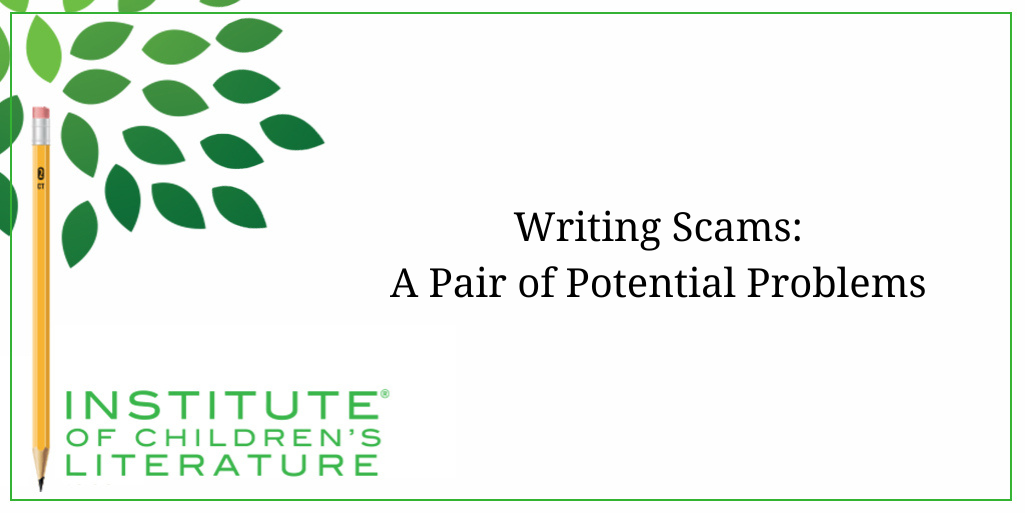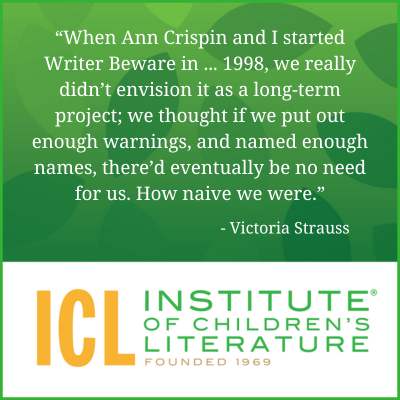
5 Ways Writers Can Prep for 2025 Goal Setting
Before we roll on to the new writing year, let’s harness our optimism for the blank slate before us and prepare for our 2025 Goal Setting just for writers.

Writing scams aren’t new. Individuals and even whole companies have popped up through the years to take money from hopeful writers while delivering little or nothing.
Fake poetry contests that put hundreds of poems (winners and runners up in the contest) into massive anthologies which they sell to each author at great expense. Or fake writing contests that make their money from extremely expensive banquets where the authors can collect their prize certificate for winning. Or publishing partnerships where the writer supplies the book and a whole lot of money and the partner produces a book, which the writer is usually encouraged to buy in large numbers.

As with most any writing scam, the point of these is to offer writers valueless services at great expense. How writing scams work changes subtly over time—mostly because there tends to be a kind of load limit on how many writers will be taken in by a particular con before they spread the word so much that few people will bite anymore. As writers become more wary of fake services and vanity presses, scammers must become sneakier. And one of the ways they’ve become sneakier is by trying to fool writers into mistaking them for valid and trustworthy companies.
One way this happens is for writers to receive emails that say they are from an agent or a publisher interested in the author’s work. Often the agent name (and even the link to the agency page) is that of a real agent such as Jenny Bent, David Dunton, Jamie Carr, and Elizabeth Weed. Other times, the scam publisher or agent “borrows” titles and authors and implies or claims to have published that person/book or to have represented their work.

So, how can authors guard against things like this when the initial email has a real company name or a real agent name? These are a few ways. First, know that legitimate companies and agents seldom ever email writers out of the blue after reading your work on your blog or an app. So be instantly suspicious if it appears you’ve been “discovered” through no effort on your part.
Also, these scammy emails are never specific about the writer’s work. They may say flowery things about the author’s writing overall but will have no specifics proving the letter writer actually read anything by the writer at all. If an agent really did happen to run across the author’s work somewhere and wanted to represent that person (keeping in mind this virtually never happens), the agent would be very specific about why. The letter would be full of the reasons why the specific things the agent read made them interested. You would find your character’s name, the themes in the story, specific plot points, and things like that.
If an agent or a publisher was so excited about your work that they connect with you out of the blue, they’re going to be specific about what grabbed them and made them behave in such an unusual way. Scam letters don’t contain specifics because the scammer didn’t read anything and doesn’t care. They are simply setting the writer up to ask for money.

Now, having said that, since I have worked with many different educational publishers and content development houses, I do sometimes get emails out of the blue from publishers I’ve not worked with before. This tends to happen when I’ve been recommended by someone. In these situations, the email contains my actual name. It is specific about the work being offered and why. Emails like that are also short. And they’re rare, even when you do the kind of writing I do. Getting a great agent or a publishing contract takes work to make the connection. They don’t drop out of the blue.
Publishing serial fiction isn’t new. In fact, some of our best-known works were published first in serial form. Charles Dickens’s works were hugely popular in serialized form when they were first written. In serial printing, a long work (like a novel) is published in small, sequential installments. Children’s magazines sometimes publish longer short stories by breaking them up into pieces to be published in successive issues of the magazine. So do some genre magazines. In recent years, this kind of serialized publishing has moved into the electronic world.
Two of the most well-known platforms for electronic serialized fiction are Wattpad (which is heavily read by young adults and teens with the most popular genre being romance) and Kindle Vella (which is Amazon’s jump into the serialized fiction pool. Vella hasn’t seen the success of Wattpad but it does have Amazon behind it). Some writers love working with these kinds of electronic platforms and have had some success with them.

Writer Beware has looked at several serialized fiction apps and written about them extensively, which is reading every writer should do before venturing into this area. These publishers often make their terms and incentives sound good when they offer them, but the only way to get the money is to produce huge amounts of work and have readers respond well to it.
These new companies popping up are often located well outside the US (Singapore, Hong Kong, etc). Being located outside the US isn’t automatically proof of bad intent. There are good companies all over the world. But knowing so many bad serialized fiction companies are presently popping into existence in Hong Kong and Singapore would make me look at contracts from such companies with special attention. I recommend you do as well.
So what are some of the contract issues you should be wary of?
* Long contract time periods. Some even for the life of copyright (thus holding onto your work for longer than you will be alive).
* No right of termination, or right of termination linked to repayment of all money. (Sometimes even repayment plus additional money).
* Signing away “moral rights.” Now, we don’t have “moral rights” grants in US contracts, but basically what you’re agreeing to is giving up a raft of rights including the right to have your name on a work, the right to object to any distortion or change to the material that would hurt your reputation. You really don’t want to sign anything that gives up your “moral rights.”
* Demands that the author never say anything negative about the company.
* Gobbling up subsidiary rights (often with no mention of payment to the writer if the company chooses to use the rights, say to make a movie script and sell it, for instance).
* Payment linked to net profit, which can mean the parent company comes up with all sorts of expenses to charge back to the book before figuring your 30% or 50% payment.
If you find yourself interested in any serialized fiction platform, read the contract carefully and research the company closely. Don’t sign things you don’t understand. Consider having a lawyer who specializes in literary rights vet the contract. (You can find resources at Authors Guild.) And if you get an out-of-the-blue solicitation from any agent or company that promises you the moon, be wary. Research and cold, calm logic will be your friend when navigating the world of publishing. These aren’t the only writing scams out there, so always take the necessary steps to be protective of yourself and your work.
With over 100 books in publication, Jan Fields writes both chapter books for children and mystery novels for adults. She’s also known for a variety of experiences teaching writing, from one session SCBWI events to lengthier Highlights Foundation workshops to these blog posts for the Institute of Children’s Literature. As a former ICL instructor, Jan enjoys equipping writers for success in whatever way she can.

Before we roll on to the new writing year, let’s harness our optimism for the blank slate before us and prepare for our 2025 Goal Setting just for writers.

Writers can be thin-skinned when it comes to getting feedback on their work. Let’s look at 4 ways to positively deal with constructive criticism!

Rejection is part of the territory when it comes to being a writer. Today we offer reflection for writers to help redirect your efforts after a rejection.
1000 N. West Street #1200, Wilmington, DE 19801
© 2024 Direct Learning Systems, Inc. All rights reserved.
1000 N. West Street #1200, Wilmington, DE 19801
© 2024 Direct Learning Systems, Inc. All rights reserved.
1000 N. West Street #1200, Wilmington, DE 19801
© 2024 Direct Learning Systems, Inc. All rights reserved.
1000 N. West Street #1200, Wilmington, DE 19801
© 2025 Direct Learning Systems, Inc. All rights reserved.
1000 N. West Street #1200, Wilmington, DE 19801
©2025 Direct Learning Systems, Inc. All rights reserved. Privacy Policy.